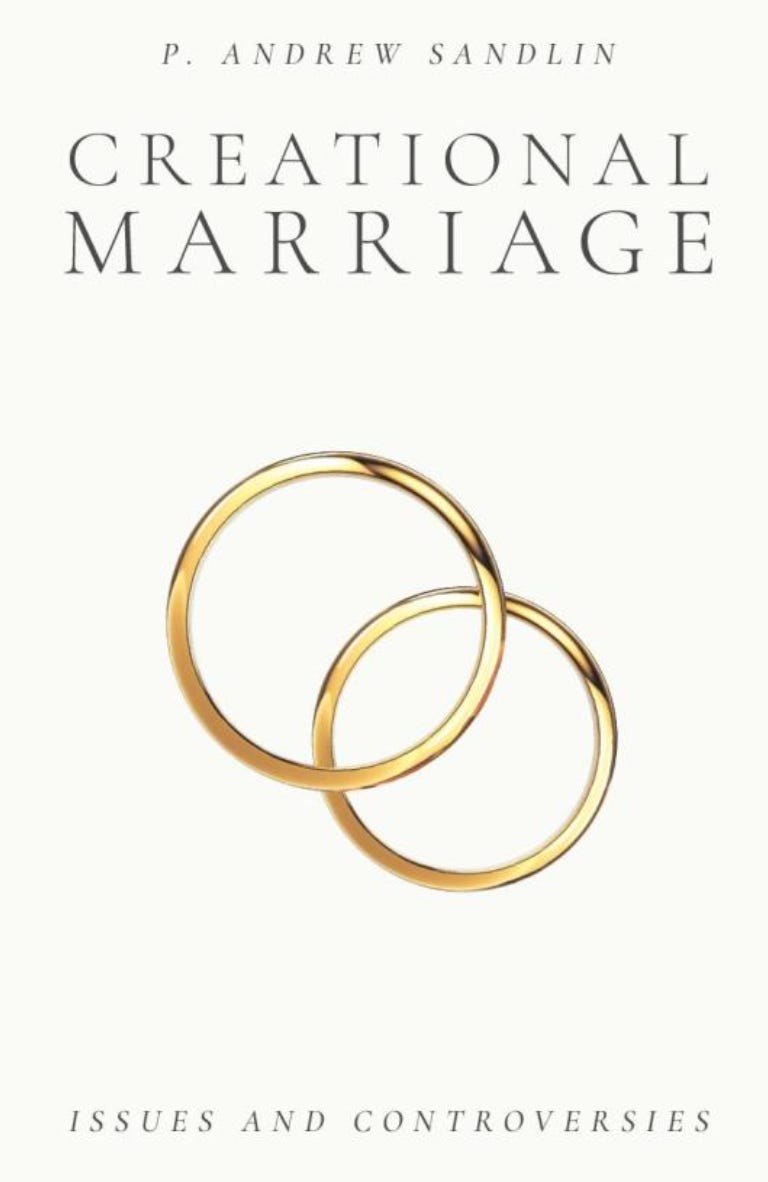The Eternal Trinity Isn’t a Pattern for Marriage
You don’t need to invoke — and may not invoke — the eternal Trinity to know that the wife must be subject to her own husband. The Bible teaches you that. The eternal (ontological) Trinity doesn’t.
Dear friends and supporters,
Ours is a culture of radical sexual egalitarianism (equality). It is unremittingly hostile to the biblical imperative that wives subject themselves to their own husbands in the Lord (the Bible does not teach women in general must be subject to men in general). This wifely subjection is rooted in the creation order. It is not due to the curse as a result of man’s sin. To oppose, therefore, the subjection of the wife to the husband is to attempt to overturn God’s cosmic creational order. Good luck with that.
Rebellion by Overreaction
In overreaction to this cultural rebellion, another form of rebellion, this one among Bible-believing Christians, has emerged. It argues that the subjection of the wife to her husband is rooted not only in the creation order but also in the eternal Trinity. It goes like this: just as the Son is eternally subordinate to the Father, so wives must be subordinate to their husbands. The wife (in this way of thinking) is analogous to the Son, and the husband is analogous to the Father. This analogy is quite different from (and actually the opposite of) the one we read in Ephesians 5, where the husband is analogous to Christ, and the wife is analogous to the church. This view is held by some patriarchalists, who champion comprehensive male authority in family, church, and culture. It is also held by some complementarians, defined as those who believe men and women are created equally in God’s image, but have some different callings. All patriarchalists are complementarian by these definitions, though not all complementarians are patriarchalists. Both patriarchalists and complementarians oppose sexual egalitarianism.
That’s not the problem. The problem is the contra-biblical and contra-orthodox proposal that the Son of God is eternally subordinate to his Father. This is a deviant (and devious) subordinationism. Subordinationism as it pertains to the Trinity is the notion that one of the members is subordinate to the other in his eternal relations. It is a flat denial of the biblical and orthodox Trinity, the foundational truth of the Christian Faith.
The Son in the Economy of Redemption
It is true that Jesus Christ the Son is subordinate to his Father in the economy of redemption. What is the economy of redemption? It is the outworking of God’s plan to save humanity, and to reverse the curse of Genesis 3. The Son willingly subordinated himself to the Father for this great specific, temporary, historical purpose. The Son is not subordinate in what is known as the ontological or essential (eternal) Trinity.
In the created order, the Son is subordinate to his Father, but it’s imperative to recognize nothing in creation corresponds to the eternal Trinity. In fact, this is the very heart of the Creator-creation distinction. In creation, for example, every human is his own being. But the Trinity consists of three persons in one being (“essence”). This is why Hebrews 1:3 can declare that the Son is the “exact imprint” of God. This denotes not just the image of God (that is true of man), but also the image of the very existence of God (that is not true of man). The Son is a different person while an identical being: identity with distinction; the same being though not a clone. Perplexing? Yes. Why? There’s nothing in creation that corresponds to the Trinity.
Why a Son?
This distinction helps point to the answer of why the Son is a son in the first place. When contemplating this, we may not begin from earthly sonship to grasp the meaning of the eternal Son of God. We begin with what the Bible tells us about the eternal Son to understand something about earthly sonship. Eternal Sonship does not parallel temporal origin (temporality is an antithesis of eternity) as in human sonship: a human father begets a son, and before this, there was no son. That son is a new being, not just a new person.
Eternal Sonship, alternatively, denotes identity without duplication, and source without origin. In other words, the Son is the very being of God, but is not identical to God the Father (or the Spirit). He draws his eternal being from the Father, but it is his eternal being; there is no origin in the Trinity. God the Father doesn’t “come first.” Father, Son, and Spirit are equally deity among themselves, equally authoritative among themselves, and equally eternal among themselves.
In other words, they are a Trinity.
Trinitarian Relations in the Church and Creation
The economic (redemptive) Trinity is, by contrast, sometimes a pattern for earthly relationships. This is clear from the first few verses of 1 Corinthians 11. God is the head of Christ, and Christ is the head of the husband, and the husband is the head of his wife. The term translated “head” is sometimes understood to mean “authority” and other times “source.” For our purposes, this distinction is not relevant. The point is that Paul is clearly laying out a hierarchy. But this hierarchy occurs within the church, and particularly public worship. (But recall that this hierarchy is a creational hierarchy, and not merely a redemptive hierarchy.)
Yet the church is not even a creational institution, and certainly not an eternal institution, though it is everlasting. It is a concession to the Fall. The Son’s submission to the Father in the outworking of redemption (think of how many times in the gospels he speaks of doing his Father’s will or fulfilling his Father’s mission) is a suitable pattern for these relationships in the church. This is the economic Trinity, not the eternal or ontological Trinity.
Egalitarian Deviance
This trinitarian theological deviance isn’t limited to patriarchalists and complementarians. Some social trinitarians (those who believe the Trinity is defined in terms of the relationships of the members) also embrace sexual egalitarianism, and they too hold that the eternal Trinity is a pattern for human relationships. In contrast to the trinitarian subordinationists, their view is basically this: since there is absolute equality within the eternal Trinity (true), there is absolute ontological equality between men and women in virtually all situations (false). Why false? Because the eternal Trinity is not a pattern for marriage or other human relationships, and this egalitarian error is no less dangerous than when committed by patriarchalists and complementarians. Here egalitarians, as well as complementarians and patriarchalists, dangerously flirt with heresy. There’s nothing in creation that corresponds to the Trinity.
Orthodox Christianity Against Subordinationism
The Athanasian Creed, one of the great catholic creeds embraced by all orthodox Christians, declares:
Nothing in this trinity is before or after,
nothing is greater or smaller;
in their entirety the three persons
are coeternal and coequal with each other.
There can be no subordination of one member of the eternal Trinity to the other, simply because all are coeternal and coequal with each other. If they weren’t coeternal and coequal, they wouldn’t be a Trinity.
To pattern the subordination of the wife to the husband after the subordination of the eternal Son to the eternal Father is warped and operationally heretical theology. You don’t need to invoke — and may not invoke — the eternal Trinity to know that the wife must be subject to her own husband. The Bible teaches you that. The eternal ontological Trinity doesn’t.
No brief treatment of the Trinity outstrips Benjamin B. Warfield’s. He was arguably the greatest theologian in American history. He writes:
As the doctrine of the Trinity is indiscoverable by reason, so it is incapable of proof from reason. There are no analogies to it in Nature, not even in the spiritual nature of man, who is made in the image of God. In His trinitarian mode of being, God is unique; and, as there is nothing in the universe like Him in this respect, so there is nothing which can help us to comprehend Him.
When God created man in his image, he did not make man an “exact imprint” of himself. A created image is not an exact imprint. Jesus Christ is an eternally exact imprint of the eternal Father in his existence. Man is a temporal image of the eternal God. When you think of the Trinity, you must get human relationships out of your mind and trust God’s revelation alone (natural theology is not merely useless to trinitarianism; it is positively catastrophic). You don’t look at creation to first understand the Trinity. You look at the Bible. Why?
Because there’s nothing in creation that corresponds to the eternal Trinity.
More on Marriage
This easy-to-understand book tackles head-on same-sex “marriage” and attraction”; female subordination in marriage; creational versus Christian marriage; complementarian and egalitarian versus Reformational marriage; the fallacy of “falling in love”; aborticide; eros in culture; the LGBT+++ agenda, the lust for singleness; the child-free life; “natural” law; and much more.
It offers nothing less than a bold, creational, Reformational view of marriage amid the present cultural chaos.
Get the book here.
The Creational Family
Listen to my talk here.
More great stuff
The Center for Cultural Leadership site is here.
My Amazon author page (print and digital) is here.
My I-Tunes sermons, lectures and podcasts are here.
You can find my sermons and lectures at my YouTube channel.
Sign up to get my blog updates here.
Here’s my Twitter feed.
If you want to get the free exclusive hard copy publication Christian Culture, please send me a Facebook private message.
The CCL phone number is 831-420-7230.
The mailing address is:
Center for Cultural Leadership
P. O. Box 100
Coulterville, CA 95311




